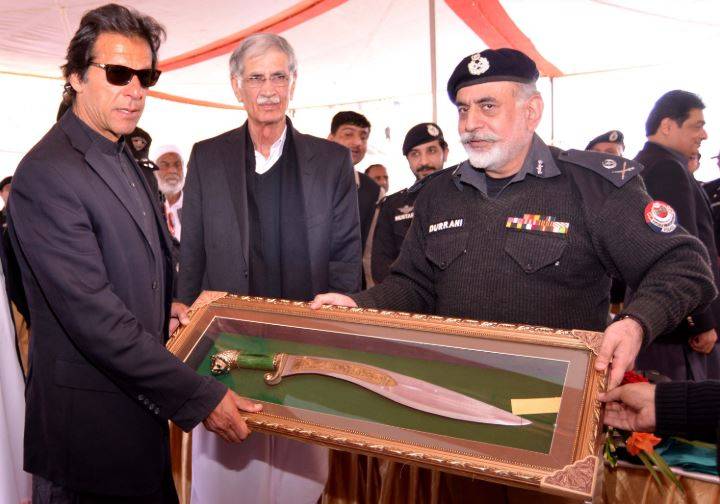
There has always been an air of due suspicion about police encounters but they would kill individuals as innocent as Naqeebullah was hardly imagined. There has been a massive outcry and demand for justice too but we fail to ask the most fundamental question: how could wrong of this magnitude happen in the first place?
This is not the work of one or two people. It's an institutional failure. The real underlying problem at the heart of this is a mammoth of a problem, but least acknowledged – the ability of police to convert day into night.
Naqeeb Mehsood’s death and similar ‘encounters’ are extreme examples of such cases where police completely turn the tables on facts and truth but the reality is, this is a very common practice in routine police cases. The magnitude of these cases maybe smaller but that doesn’t make the ordeals of people any lesser when state institutions are responsible for committing injustice instead of delivering justice.
More importantly, it is these failures on daily basis that set up the culture that leads to massive failures down the road like fake encounters.
The most common forms of these cases are police registering wrongful FIRs on victims rather than on the real offenders, often to side with the more powerful party and to harass and intimidate the victims so they don’t pursue their cases. But perhaps even more disturbing is the state of affairs of police’s own investigations where they distort facts and hide the truth, showing complete lack of integrity. This gives the necessary room for all the evil that exists in Police because they are never really inclined to catch it but to hide and protect it.
The lack of integrity is an accepted norm inside our police culture. There is no punishment for it and there are no consequences if anyone is caught lying. It is almost considered a right of policemen to lie.
If I start writing about integrity issues in the police, I could write a book on it and I have, which is a detailed autopsy of a police case, perhaps the first of its kind. It shows in detail how police operates in reality with concrete examples. It is also a story how an incident that happened on the watch of police yet the FIR is registered against the victim and others who were not even present but yet there is no FIR against the actual assailers because they are influentials.
I have narrated the briefs of my family’s ordeal here which is a typical organic police case without the social media pressure but it might come as surprise that police manipulate things even in high profile social media cases. Given the experience my family has had working with KP Police, I want to briefly re-examine few high profile cases particularly in KP since I know them the best and after all they claim major reforms to highlight this core problem and how they mislead everyone instead of addressing the real problem.
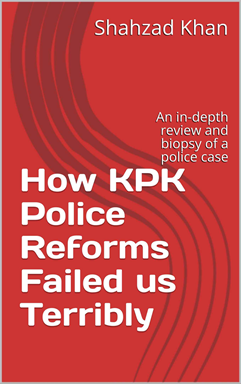
DI Khan girl case
The young girl in DI Khan was paraded naked. The incident caught major media attention. Despite such an outrageous incident taking place and then catching media attention, the local police station registering an FIR against the victim’s brother instead of registering her FIR. They even mistreated the lady. The events took a different turn when the incident quickly became viral on social media and only then the girl’s FIR was registered and the one against her was squashed.
Police investigated the matter but surprisingly didn’t find any wrongdoings on part of the SHO of local police station or anybody else. This happened despite the fact that the victim family appeared on national TV and narrated their ordeal.
The social media pressure at least resulted in the wrongful FIR being squashed against the family but that (1) it was registered (2) police investigation didn’t find any wrongdoings on part of police highlights the pattern I am trying to point out.
Let’s step up to a more complex example.
The Swat Incident
This incident recently became viral on social media when a motorist shared his video where he was accusing KP Police of accepting bribe. The KP Police later issued formal clarification that there was no wrongdoing on part of the police and that they had stopped two motorists who were over-speeding.
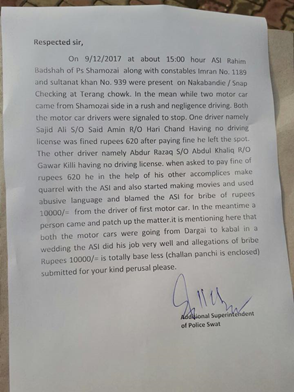
They gave challan to one of them who paid it but when they give it to the 2nd he started creating disturbance & accusations. They also “praised” their police for handling the matter in a measured manner.
However, if we examine the video closely, it tells of a different story. That said, the video, indeed, is a little confusing because the motorist is accusing police of taking RS 10,000 bribe which looks rather absurd at first glance as why would someone take that much money when challan itself is of only Rs 620?
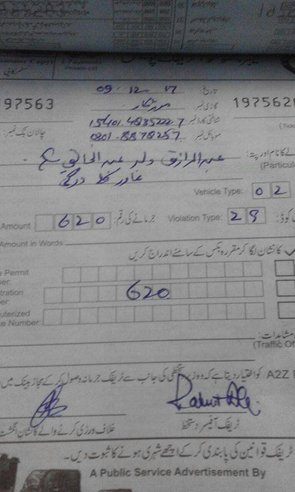 The answer becomes clear if we pay close attention to the video and watch it in full length. The motorist is claiming (in Pashto) that the other car had hit his car. The policeman on the scene took him into confidence that he will resolve the matter and even took his car’s keys but went to the other car and then let him go! This was why the man in the video was so disgruntled; because he feels that the policeman had betrayed him and that was why he was alleging the policeman of taking Rs 10,000 – to rescue the other party from damages, not because of challan.
The answer becomes clear if we pay close attention to the video and watch it in full length. The motorist is claiming (in Pashto) that the other car had hit his car. The policeman on the scene took him into confidence that he will resolve the matter and even took his car’s keys but went to the other car and then let him go! This was why the man in the video was so disgruntled; because he feels that the policeman had betrayed him and that was why he was alleging the policeman of taking Rs 10,000 – to rescue the other party from damages, not because of challan.
Now we don’t know from video if the policeman did indeed took Rs 10,000 or any bribe for that matter but the conflict is about cars’ collision which police didn’t mention at all in their clarification and claimed that it was a case of over-speeding, a matter completely different.
There are other potential problems with police side of the story as well besides staying completely silent on the collision issue. They said there were no ‘independent’ witnesses on the scene. This also confirms that police was on the wrong side and thus conveniently discarded all witnesses as being ‘not independent’!
Police also says in their clarification that the speeding cars did not stop but when they did, they applied the brakes so hard that it left skid marks on the road. However this again appears to be more consistent with the ‘accident’ side of the story which usually leaves skid marks, not someone who is merely making a routine stop for the police.
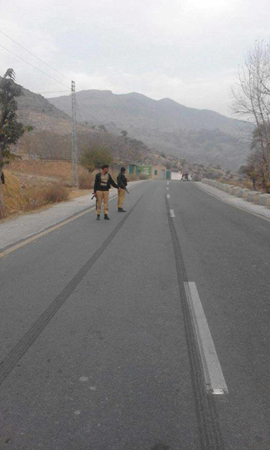
It is also worth noting that while police claims they were over-speeding and that’s why they were stopped, at the same time they were not given tickets for over-speeding but for not having licenses. So if police is adamant on over-speeding charge, why didn’t they issue the tickets for this violation?
The fact that the policeman appeared to have issued wrongful tickets to both the drivers to cover the crime legally shows the level of sophistication of corruption and misappropriation. This inadvertently also means that the person whose car was hit is now also paying a fine to cover up for the alleged bribe!
We notice once again how the senior police officers conducted an inquiry and didn’t find anything wrong and defended their own ilk instead of taking corrective action.
This incident again demonstrates the problem with the police culture, how they convert one thing (alleged car collision) into something completely different (over-speeding). The sophistication with which they did this is quite disturbing.
KP’s Police own fake encounter in Khazana – Peshawar
This is a fake encounter that took place in the jurisdiction of Peshawar police in Khazana at the peak of KP Police Reforms in 2016. An investigation was conducted which concluded that the ‘encounter’ was fabricated. However the then Peshawar CCPO changed the inquiry officer and the new investigation report appeared even more mysterious. This is typical of how police handles cases where they complicate & convolute things in an attempt to convert reality into something else and rescue their own. I quote from the article:
“After the report was submitted, CCPO Mubarak Zeb Khan changed the enquiry officer and asked SP Rural to conduct the enquiry once again. The subsequent report that was submitted made the entire episode even more mysterious and the victim’s relatives said Khan was trying to favour the SHO and attempting to provide him with a safe exit.”
It was only when the relatives of the deceased attacked the police station and blocked the main road, that the then IGP Nassir Durrani took matter in his own hands and ordered murder FIR against the SHO. However, no action was taken against the CCPO for trying to cover up the matter and rescue the SHO. It is extremely rare in police to act against any senior officer in the department.
This is the attitude and culture in our police. Unless there is extraordinary amount of street pressure, they will not even take corrective measures and even if they do, the officers trying to rescue their own are always let off the hook.
Can we really fight and end fake encounters/corruption within police with this attitude?
Other cases
Above are just a handful of examples. There are countless others of various natures. There are cases when police manipulated evidence and it was already a lost battle for the victims before their struggle for justice even began. This woman in Nowshera claimed that police had destroyed the evidence she gave them related to rape and even though she had fought a long battle, she could never get justice.
The integrity issues are not limited to the lower staff alone but they can embarrassingly reach the top brass. This is because the senior officers either have blind faith in their subordinates or they are naïve enough to believe anything they’re told.
KP Police chief recently declared in a press conference regarding Asma murder case in Mardan that they had started searching for little Asma right after the incident was reported but the media reports that there was no such search operation. Is this okay for the police chief to make such misleading statements/claims?
Conclusion
The unimaginable calamity that happened to Naqeeb, demands more than just asking for punishment for the accused. We need to learn how these things happen and how they should be prevented in the future.
There is complete breakdown of integrity and basic operative values in the police force, which has rendered its foundation completely rotten. This, in fact, is the mother of all problems in the police department.
I have given examples from KP Police due to my familiarity with them to show their state of affairs; after all they care claiming to be the best in Pakistan. But if such is the state of integrity in their ranks, how good could their reforms really be when the claims of reforms are also coming from the same department?
Pakistan police needs meaningful reforms and restoring integrity in police ranks should be the first and foremost priority on the agenda of the new government, without which any other reforms are impossible.
This is not the work of one or two people. It's an institutional failure. The real underlying problem at the heart of this is a mammoth of a problem, but least acknowledged – the ability of police to convert day into night.
Naqeeb Mehsood’s death and similar ‘encounters’ are extreme examples of such cases where police completely turn the tables on facts and truth but the reality is, this is a very common practice in routine police cases. The magnitude of these cases maybe smaller but that doesn’t make the ordeals of people any lesser when state institutions are responsible for committing injustice instead of delivering justice.
More importantly, it is these failures on daily basis that set up the culture that leads to massive failures down the road like fake encounters.
The most common forms of these cases are police registering wrongful FIRs on victims rather than on the real offenders, often to side with the more powerful party and to harass and intimidate the victims so they don’t pursue their cases. But perhaps even more disturbing is the state of affairs of police’s own investigations where they distort facts and hide the truth, showing complete lack of integrity. This gives the necessary room for all the evil that exists in Police because they are never really inclined to catch it but to hide and protect it.
The lack of integrity is an accepted norm inside our police culture. There is no punishment for it and there are no consequences if anyone is caught lying. It is almost considered a right of policemen to lie.
If I start writing about integrity issues in the police, I could write a book on it and I have, which is a detailed autopsy of a police case, perhaps the first of its kind. It shows in detail how police operates in reality with concrete examples. It is also a story how an incident that happened on the watch of police yet the FIR is registered against the victim and others who were not even present but yet there is no FIR against the actual assailers because they are influentials.
I have narrated the briefs of my family’s ordeal here which is a typical organic police case without the social media pressure but it might come as surprise that police manipulate things even in high profile social media cases. Given the experience my family has had working with KP Police, I want to briefly re-examine few high profile cases particularly in KP since I know them the best and after all they claim major reforms to highlight this core problem and how they mislead everyone instead of addressing the real problem.

DI Khan girl case
The young girl in DI Khan was paraded naked. The incident caught major media attention. Despite such an outrageous incident taking place and then catching media attention, the local police station registering an FIR against the victim’s brother instead of registering her FIR. They even mistreated the lady. The events took a different turn when the incident quickly became viral on social media and only then the girl’s FIR was registered and the one against her was squashed.
Police investigated the matter but surprisingly didn’t find any wrongdoings on part of the SHO of local police station or anybody else. This happened despite the fact that the victim family appeared on national TV and narrated their ordeal.
The social media pressure at least resulted in the wrongful FIR being squashed against the family but that (1) it was registered (2) police investigation didn’t find any wrongdoings on part of police highlights the pattern I am trying to point out.
Let’s step up to a more complex example.
The Swat Incident
This incident recently became viral on social media when a motorist shared his video where he was accusing KP Police of accepting bribe. The KP Police later issued formal clarification that there was no wrongdoing on part of the police and that they had stopped two motorists who were over-speeding.

They gave challan to one of them who paid it but when they give it to the 2nd he started creating disturbance & accusations. They also “praised” their police for handling the matter in a measured manner.
However, if we examine the video closely, it tells of a different story. That said, the video, indeed, is a little confusing because the motorist is accusing police of taking RS 10,000 bribe which looks rather absurd at first glance as why would someone take that much money when challan itself is of only Rs 620?
 The answer becomes clear if we pay close attention to the video and watch it in full length. The motorist is claiming (in Pashto) that the other car had hit his car. The policeman on the scene took him into confidence that he will resolve the matter and even took his car’s keys but went to the other car and then let him go! This was why the man in the video was so disgruntled; because he feels that the policeman had betrayed him and that was why he was alleging the policeman of taking Rs 10,000 – to rescue the other party from damages, not because of challan.
The answer becomes clear if we pay close attention to the video and watch it in full length. The motorist is claiming (in Pashto) that the other car had hit his car. The policeman on the scene took him into confidence that he will resolve the matter and even took his car’s keys but went to the other car and then let him go! This was why the man in the video was so disgruntled; because he feels that the policeman had betrayed him and that was why he was alleging the policeman of taking Rs 10,000 – to rescue the other party from damages, not because of challan.Now we don’t know from video if the policeman did indeed took Rs 10,000 or any bribe for that matter but the conflict is about cars’ collision which police didn’t mention at all in their clarification and claimed that it was a case of over-speeding, a matter completely different.
There are other potential problems with police side of the story as well besides staying completely silent on the collision issue. They said there were no ‘independent’ witnesses on the scene. This also confirms that police was on the wrong side and thus conveniently discarded all witnesses as being ‘not independent’!
Police also says in their clarification that the speeding cars did not stop but when they did, they applied the brakes so hard that it left skid marks on the road. However this again appears to be more consistent with the ‘accident’ side of the story which usually leaves skid marks, not someone who is merely making a routine stop for the police.

It is also worth noting that while police claims they were over-speeding and that’s why they were stopped, at the same time they were not given tickets for over-speeding but for not having licenses. So if police is adamant on over-speeding charge, why didn’t they issue the tickets for this violation?
The fact that the policeman appeared to have issued wrongful tickets to both the drivers to cover the crime legally shows the level of sophistication of corruption and misappropriation. This inadvertently also means that the person whose car was hit is now also paying a fine to cover up for the alleged bribe!
We notice once again how the senior police officers conducted an inquiry and didn’t find anything wrong and defended their own ilk instead of taking corrective action.
This incident again demonstrates the problem with the police culture, how they convert one thing (alleged car collision) into something completely different (over-speeding). The sophistication with which they did this is quite disturbing.
KP’s Police own fake encounter in Khazana – Peshawar
This is a fake encounter that took place in the jurisdiction of Peshawar police in Khazana at the peak of KP Police Reforms in 2016. An investigation was conducted which concluded that the ‘encounter’ was fabricated. However the then Peshawar CCPO changed the inquiry officer and the new investigation report appeared even more mysterious. This is typical of how police handles cases where they complicate & convolute things in an attempt to convert reality into something else and rescue their own. I quote from the article:
“After the report was submitted, CCPO Mubarak Zeb Khan changed the enquiry officer and asked SP Rural to conduct the enquiry once again. The subsequent report that was submitted made the entire episode even more mysterious and the victim’s relatives said Khan was trying to favour the SHO and attempting to provide him with a safe exit.”
It was only when the relatives of the deceased attacked the police station and blocked the main road, that the then IGP Nassir Durrani took matter in his own hands and ordered murder FIR against the SHO. However, no action was taken against the CCPO for trying to cover up the matter and rescue the SHO. It is extremely rare in police to act against any senior officer in the department.
See also: Not a single grade-18 or above police officer is punished under reforms.
This is the attitude and culture in our police. Unless there is extraordinary amount of street pressure, they will not even take corrective measures and even if they do, the officers trying to rescue their own are always let off the hook.
Can we really fight and end fake encounters/corruption within police with this attitude?
Other cases
Above are just a handful of examples. There are countless others of various natures. There are cases when police manipulated evidence and it was already a lost battle for the victims before their struggle for justice even began. This woman in Nowshera claimed that police had destroyed the evidence she gave them related to rape and even though she had fought a long battle, she could never get justice.
The integrity issues are not limited to the lower staff alone but they can embarrassingly reach the top brass. This is because the senior officers either have blind faith in their subordinates or they are naïve enough to believe anything they’re told.
KP Police chief recently declared in a press conference regarding Asma murder case in Mardan that they had started searching for little Asma right after the incident was reported but the media reports that there was no such search operation. Is this okay for the police chief to make such misleading statements/claims?
Conclusion
The unimaginable calamity that happened to Naqeeb, demands more than just asking for punishment for the accused. We need to learn how these things happen and how they should be prevented in the future.
There is complete breakdown of integrity and basic operative values in the police force, which has rendered its foundation completely rotten. This, in fact, is the mother of all problems in the police department.
I have given examples from KP Police due to my familiarity with them to show their state of affairs; after all they care claiming to be the best in Pakistan. But if such is the state of integrity in their ranks, how good could their reforms really be when the claims of reforms are also coming from the same department?
Pakistan police needs meaningful reforms and restoring integrity in police ranks should be the first and foremost priority on the agenda of the new government, without which any other reforms are impossible.
